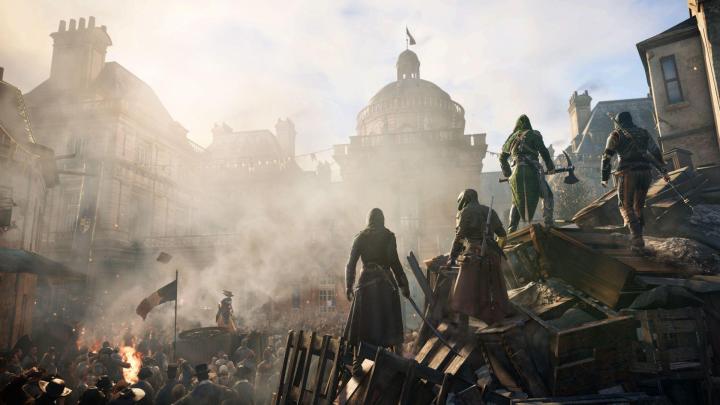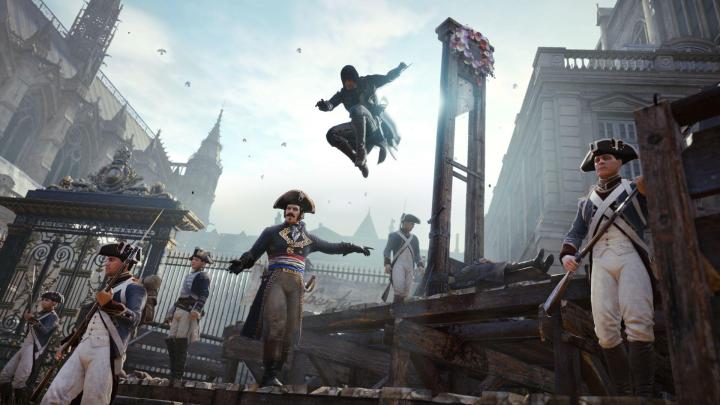
We didn’t get to see all of this in action at E3, but we did get a better sense of what to expect from the October 28 release during a private session with the game.
Story/Concept
Vive la France! Assassin’s Creed: Unity‘s alt-history tale kicks off at the start of the French Revolution, following Frenchman Arno Dorian as he joins and rises through the ranks of the ancient order of Assassins. The bulk of the game is set in Paris, which spreads out across seven districts, but players also get to visit Arno’s Versailles home. All told, Unity‘s real estate is roughly three times the size of Black Flag‘s combined landmasses.
Less is known of the present-day side of the story. Players still access Arno’s memories as part of research for an Abstergo Entertainment video game, but the influence of the Assassins is said to factor in more prominently. We’re also told that Black Flag‘s first-person perspective approach to the present-day story won’t be quite the same in Unity, but the “how” of that remains a mystery at present.
Gameplay
Going down. Arno is just as agile as his Assassin predecessors from the previous games, but Ubi Montreal added a new wrinkle to the series’ trademark parkour scrambling in the form of a mechanic called “controlled descents.” Think of it as an assisted downward climb. You’re still able to leap off of buildings into piles of hay, but holding both right trigger and B (Xbox controller) simultaneously as you approach a ledge prompts Arno to scale his way down the side of a structure using the most direct path available.
Fragile. All of the previous Assassin’s Creed games featured combat-capable protagonists that, in the hands of an experienced player, could effectively stab their way through an army of Templars and other foes. For Unity, Ubi Montreal set out to bring a stealth emphasis back to the series using a twofold approach. The first is a stealth mode toggle, to replace contextual sneaking from other recent AC games. Tap a button to drop Arno down into a sound-muffled crouch.

The bigger change is to how combat plays out. Controls appear to be roughly the same, a mix of timed attacks and counters, but taking on a large group is no longer a viable strategy for survival. Four or more foes is a no-win situation, thanks to enhanced AI that’s tuned to recognize when there’s a numbers advantage and attack more dynamically. The “fight circle” of enemies that forms around an assassin, which each attacker taking turns (effectively lining up to be stabbed, one at a time), is no more.
Your own story. Assassin’s Creed: Unity has the same sort of mission-driven overarching story that the previous games did, but added effort has gone into coming up with mini-narratives for any number of optional missions scattered throughout the world. A lot of the enhancements here are little more than promises at this point, but the idea is for players to stumble into any number of smaller dramas as they wander. Cooperative play is similarly worked into the fabric of the larger fiction, with players calling on their assassin brothers (not sisters) by visiting pubs scattered throughout the city.

A beefed up quest log provides quick access to any discovered optional mission, but a new feature shows any nearby quest markers in the HUD whenever Arno ventures up to a rooftop. It’s driven by the idea that the rooftops of Paris belong to the Assassins, who use these elevated locations to keep a watch over the city.
Presentation
Mob mentality. Assassin’s Creed: Unity etches out a lot of detail in this open world take on late-18th century Paris. The city buzzes with life, as various citizens live out their own mini-stories, same as always. The most immediately obvious difference — other than the sharper visual fidelity overall — is the size of crowds. The improved processing power of the new consoles gives Ubi Montreal the ability to populate the city streets with hundreds upon hundreds of citizens. It adds so much flavor and detail to the surroundings, especially given the story’s French Revolution setting.
Takeaway
It’s hard to say after such a brief preview, but it certainly looks like fans should prepare for some significant changes in Assassin’s Creed: Unity. The shift in emphasis to more stealthy gameplay could be a great thing, a fresh take that series has been in sore need of for some time. We’ll have to wait and see how the missions all fit together. The series started out by hanging its hat on sneaky murderfests, but stealth-heavy play also runs the risk of increasing the ratio of less popular tailing and eavesdropping missions.
We’ll surely hear more before Assassin’s Creed: Unity comes to PC, PlayStation 4, and Xbox One on October 28.





